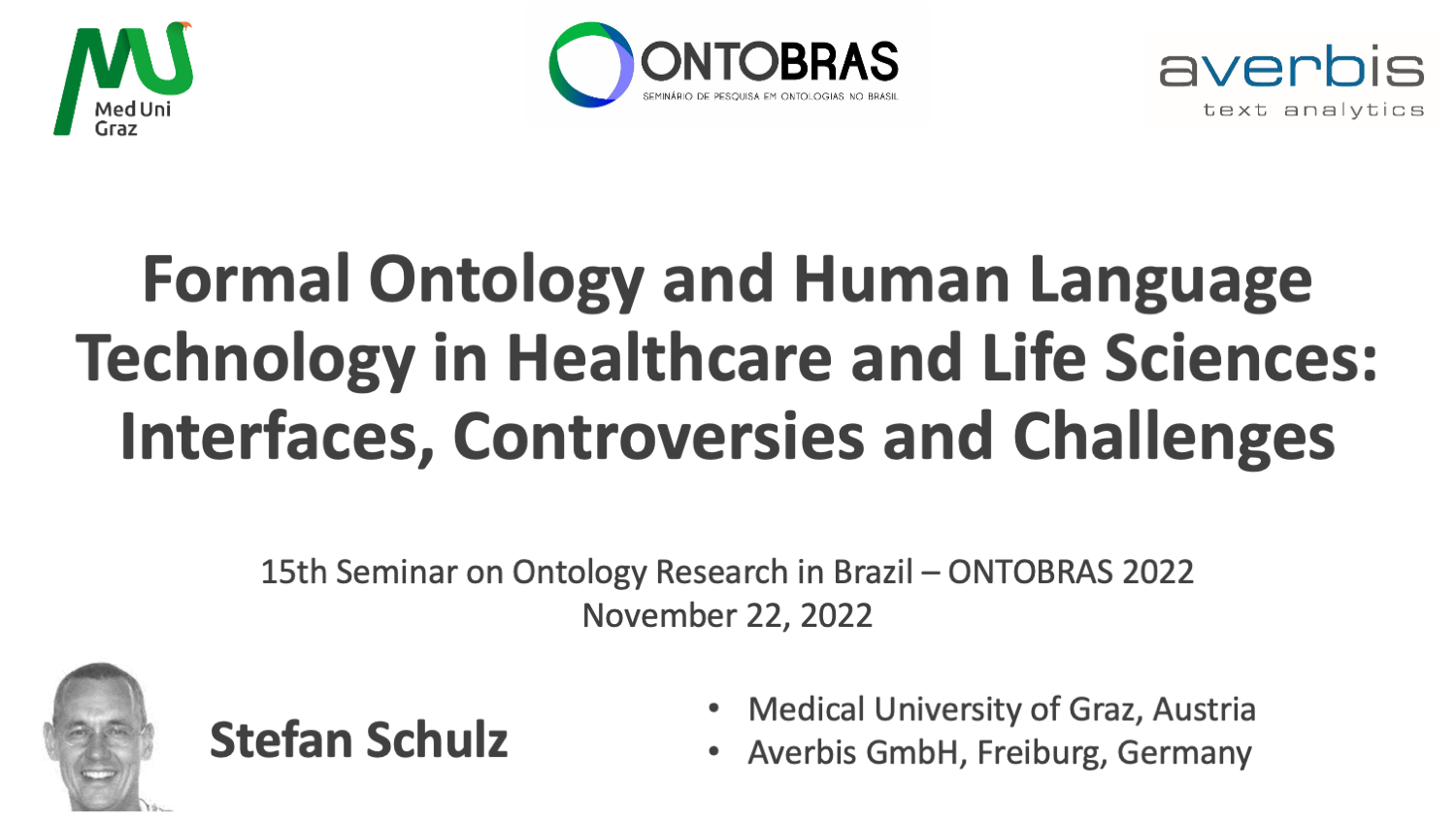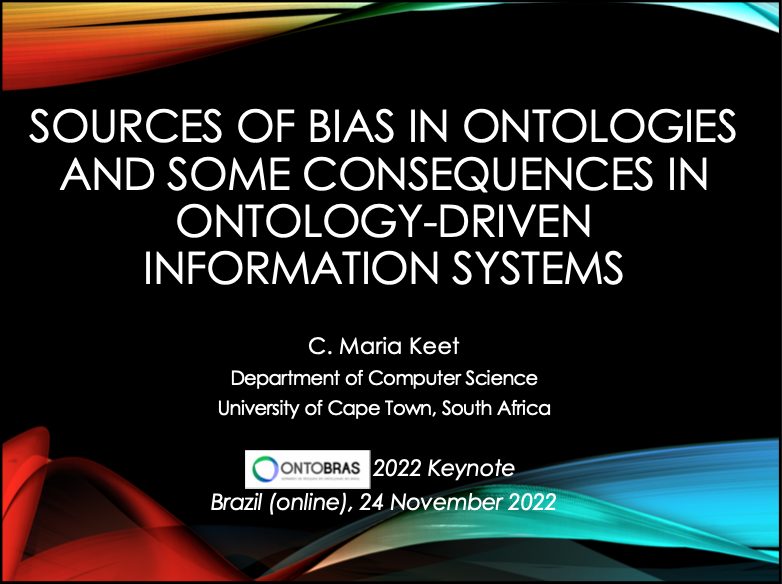Formal Ontology and Human Language Technology in Healthcare and Life Sciences: Interfaces, Controversies and Challenges
Stefan Schulz
Although life sciences and healthcare produce large amounts of structured data such as research datasets and health-related population reports, unstructured natural language remains the cornerstone of human communication and documentation.
Life sciences and health care are among the areas that are best supplied with knowledge resources of many kinds, and that are the ones most committed to the claim that ontologies should describe and standardize the reality of research and clinical practice.
In contrast, linguists have always tended to represent discourse as such; and the current language understanding approaches follow a data-driven paradigm, in which the semantics of natural language expressions are represented mathematically by mapping them onto multidimensional vector spaces, which are explicitly agnostic to any extra-linguistic reality.
In this talk, I want to show bridges between these two seemingly irreconcilable views. Focusing on the healthcare realm, I will argue that the tension between data and reality has always been inherent in clinical practice and discourse (e.g., characterized by the diagnosis vs. disease dichotomy). I will highlight the increasing importance of semantic standardization of domain entities and the importance of precise semantics as the key to data and knowledge interoperability, which characterises research and practice increasingly showcased as “precision medicine”.

Bio: Stefan Schulz, trained as MD, holds a doctorate in Theoretical Medicine from University of Heidelberg and is Full Professor of Medical Informatics at Medical University of Graz. His research has focused on clinical language, ontologies and terminologies. He provides support to standards development for SNOMED International and serves the German company Averbis in the role of head of medical research in several large research networks, which use text analytics for secondary use of clinical data.
Knowledge Acquisition for Ontology Development
Mara Abel
Before designing a software application, the engineer needs to define the conceptual model to understand and simplify reality. In order to guarantee that the software can be further integrated and understood, the community of users needs to share this conceptualization. Ontologies differ from data models in the sense that the semantic is not based on the software application needs, but in the common acquaintance of the terminology among a community along with the philosophical view about world understanding. This talk introduces practical steps and techniques for knowledge elicitation with the focus of producing well-founded domain ontologies for industrial projects. We discuss how to select the professionals and legacy material that will be the source of knowledge. The content considers and discusses previously developed cases on oil and gas industry. We aim the explanation would be useful for general use in conceptual modeling tasks.

Bio: The lecturer has graduated in Geology and as a Doctor degree in Computer Science at UFRGS (sandwich and supervision from University College London). She acts in the PG Program in CS of UFRGS where she teaches and supervise theses in Ontology Engineering. She is the leader of the Computing Systems for Petroleum Exploration & Production Research Group and accumulates 35 years of experience in knowledge acquisition, especially knowledge elicitation from human sources for the petroleum industry. She has coordinated dozens of research cooperations with industry for knowledge systems development. Actualy, she coordinate the Petwin Project, an international industrial cooperation for the application of ontologies in digital twins for petroleum production optimization.
Sources of Bias in Ontologies and Some Consequences in Ontology-Driven Information Systems
Maria Keet
Ontologies are used in a multitude of information systems and also to enhance data analytics. While algorithmic bias is well-known, what bias means for ontologies that provide a structuring mechanism for, e.g., an algorithm’s or query’s input has not been investigated widely. What are the sources of bias for ontologies and how do they manifest in ontologies? Eight broad sources that can cause bias are assessed on if, where, and how that may affect an ontology’s content, illustrated with examples from ontologies and samples from the literature. This is augmented with 6 applicable recognised cognitive biases. We also examined extant ontologies on modelling bias, which also assisted in assessing where any bias in an ontology likely will have the biggest impact during deployment of ontologies. This first characterisation aims contribute to a sensitisation of bias in ontologies primarily regarding representation of the knowledge, and thus also indicates avenues for future work.

Bio: Maria Keet (PhD, MSc, MA, BSc(hons)) is an Associate Professor with the Department of Computer Science, University of Cape Town. She focuses on ontology engineering, conceptual data modelling, and their interaction with natural language tools, which has resulted in around 150 publications at venues including FOIS, K-CAP, EKAW, ESWC, ER, Applied Ontology, DKE, and the Semantic Web Journal. She is, and was, PI on two NRF-funded projects on NLG with ontologies, and was PI on an DST/MINCyT-funded bi-lateral project with Argentina on ontology-driven conceptual modelling, and she was involved in several EU projects. She has served in numerous Program Committees reviewed for numerous journals; recently she has been a PC chair for, among others, the ISWC 2022 Resources Track, IJCAI 2021 Demos, and EKAW 2020. She also wrote an award-winning textbook on ontology engineering.
Before her employment at UCT, Maria was Senior lecturer at the School of Computer Science, University of KwaZulu-Natal, South Africa and before that, a non-tenured Assistant Professor at the KRDB Research Centre, Free University of Bozen-Bolzano, Italy. She obtained a PhD in Computer Science at the KRDB Research Centre in 2008.
Website: http://www.meteck.org/
Semantics Technologies Applied to Smart Buildings – Overview of the PHOENIX Project
Josiane Xavier Parreira
With the European Green Deal and the Renovation Wave, the EU is promoting the upgrade of the building stock. Under the revision of the European Energy Performance of Buildings Directive in 2018, the EU has introduced the Smart Readiness Indicator (SRI) – a common EU framework for rating the smart readiness of buildings. The SRI provides information on the technological readiness of buildings for interacting with their occupants and the energy grids, and their capabilities for more efficient operation and better performance through ICT technologies.
In this talk I will present how Semantic technologies are being used to describe, integrate, and analyse buildings and their performance, to support the optimization of the energy usage, as well as the buildings’ communication with their occupants and the grid. This work is being carried out in the context of the Horizon 2020 project PHOENIX.

Bio: Josiane Xavier Parreira is a Senior Research Scientist at Siemens AG Austria. She received her MSc and PhD at the Max Planck Institute for Informatics / University of Saarland. Germany. Before joining Siemens AG Austria, she worked as a Postdoctoral Researcher and Adjunct Lecturer at the INSIGHT Centre for Big Data Analytics (former DERI) at the National University of Ireland in Galway, Ireland. Her research interested are Semantic stream processing, IoT, and Knowledge Graphs for smart infrastructures.


